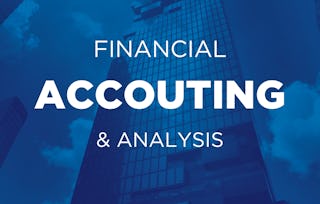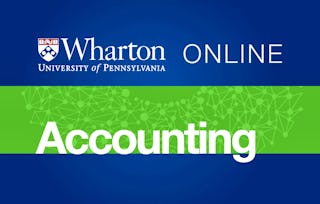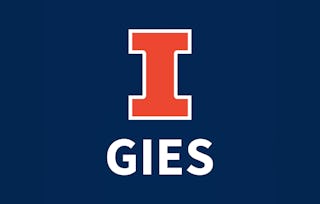Master the technical skills needed to analyze financial statements and disclosures for use in financial analysis, and learn how accounting standards and managerial incentives affect the financial reporting process. By the end of this course, you’ll be able to read the three most common financial statements: the income statement, balance sheet, and statement of cash flows. Then you can apply these skills to a real-world business challenge as part of the Wharton Business Foundations Specialization.

Introduction to Financial Accounting
Seize the savings! Get 40% off 3 months of Coursera Plus and full access to thousands of courses.

Introduction to Financial Accounting
This course is part of multiple programs.

Instructor: Brian J Bushee
397,911 already enrolled
Included with
8,503 reviews
Details to know

Add to your LinkedIn profile
10 assignments
See how employees at top companies are mastering in-demand skills

Build your subject-matter expertise
- Learn new concepts from industry experts
- Gain a foundational understanding of a subject or tool
- Develop job-relevant skills with hands-on projects
- Earn a shareable career certificate

There are 4 modules in this course
To learn a foreign language like Accounting, you need quite a bit of practice in the basic foundations (grammar, syntax, idioms, etc.). This material is absolutely essential for being able to read and to understand books written in the language (in our case, financial statements.). This week, we will start building these foundations. We will start with an overview of financial reporting. What types of reports are required? Who makes the rules? Who enforces the rules? Then, we will cover the balance sheet equation and define/discuss Assets, Liabilities, and Stockholders' Equity. We will introduce debit-credit bookkeeping and do lots of practice in translating transactions into debits and credits. Finally, we will introduce a case of a start-up company to provide you insights into all of the steps necessary to go from recording the first transactions of a new business all the way through its first set of financial statements.
What's included
9 videos7 readings3 assignments
We will start with a discussion of Accrual Accounting and how it affects the recognition of the Income Statement accounts: Revenues and Expenses. Then, we will cover adjusting entries, which are needed to prepare our internal books for the upcoming financial statements. Finally, we will discuss closing entries and the preparation of the Balance Sheet and Income Statement. At each stage, we will continue to work on the case of our start-up company. If you are not sick and tired of journal entries by the end of this week, then I have not done my job!
What's included
8 videos6 readings2 assignments
Cash is King! We will start with the classification of cash flows into operating, investing, and financing activities. Then, we will work on preparing and analyzing the Statement of Cash Flows. We will wrap up the case on the start-up company by preparing and analyzing its Statement of Cash Flows. Finally, we will discuss the differences between Earnings, Cash from Operations, EBITDA, and Free Cash Flow.
What's included
7 videos4 readings2 assignments
We will have our final exam this week. Because of the exam, I will cover Ratio Analysis, which will not involve any "new" material. While we will define and discuss a number of ratios, they will all basically involve dividing one accounting number by another. But, the analysis of what those ratios mean will involve a deep understanding of Balance Sheet and Income Statement accounts. Thus, the Ratio Analysis videos will help provide a nice review of the material, which will help you prepare for the exam. However, there will be no questions about ratio analysis on the exam. The only thing left to do after this exam is to impress your family, friends, and co-workers with your vast knowledge of Financial Accounting!
What's included
5 videos3 readings3 assignments
Earn a career certificate
Add this credential to your LinkedIn profile, resume, or CV. Share it on social media and in your performance review.
Instructor

Offered by
Explore more from Business Essentials
 Status: Free Trial
Status: Free TrialFundação Instituto de Administração
 Status: Free Trial
Status: Free TrialUniversity of Virginia
 Status: Free Trial
Status: Free TrialUniversity of Pennsylvania
 Status: Free Trial
Status: Free TrialUniversity of Illinois Urbana-Champaign
Why people choose Coursera for their career

Felipe M.

Jennifer J.

Larry W.

Chaitanya A.
Learner reviews
- 5 stars
80.85%
- 4 stars
14.48%
- 3 stars
2.96%
- 2 stars
0.84%
- 1 star
0.84%
Showing 3 of 8503
Reviewed on Feb 14, 2020
maybe it is me, but exam #3 has some contradictory information because upon reviewing feedback there were instances where an item would be correct. and after a new test it would be deemed incorrect.
Reviewed on Jun 18, 2017
Professor Bushee made this course an incredible fun experience! He did an amazing job in keeping my attention and motivation thru the course. Thank you Professor for the fun learning experience!
Reviewed on May 15, 2020
Excellent. Easy to understand. As thought Prof Brian Bushee can read your mind and know what questions you are thinking even before you can ask them. Also appreciate his humour. Enjoyed this one.

Open new doors with Coursera Plus
Unlimited access to 10,000+ world-class courses, hands-on projects, and job-ready certificate programs - all included in your subscription
Advance your career with an online degree
Earn a degree from world-class universities - 100% online
Join over 3,400 global companies that choose Coursera for Business
Upskill your employees to excel in the digital economy
Frequently asked questions
To access the course materials, assignments and to earn a Certificate, you will need to purchase the Certificate experience when you enroll in a course. You can try a Free Trial instead, or apply for Financial Aid. The course may offer 'Full Course, No Certificate' instead. This option lets you see all course materials, submit required assessments, and get a final grade. This also means that you will not be able to purchase a Certificate experience.
When you enroll in the course, you get access to all of the courses in the Specialization, and you earn a certificate when you complete the work. Your electronic Certificate will be added to your Accomplishments page - from there, you can print your Certificate or add it to your LinkedIn profile.
Yes. In select learning programs, you can apply for financial aid or a scholarship if you can’t afford the enrollment fee. If fin aid or scholarship is available for your learning program selection, you’ll find a link to apply on the description page.
More questions
Financial aid available,

